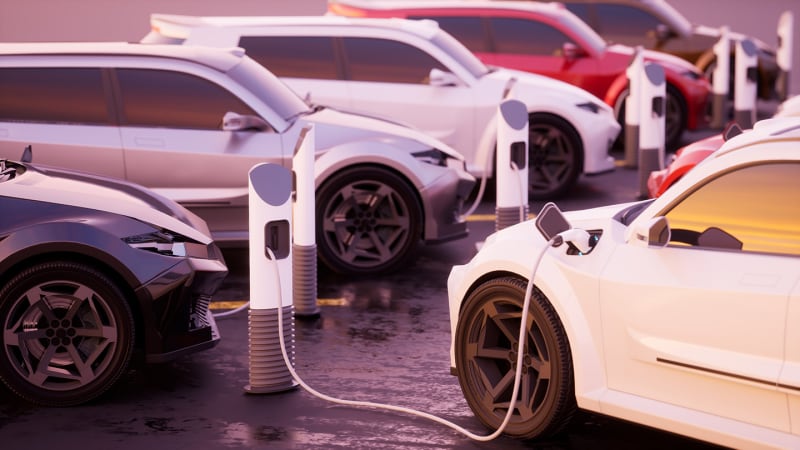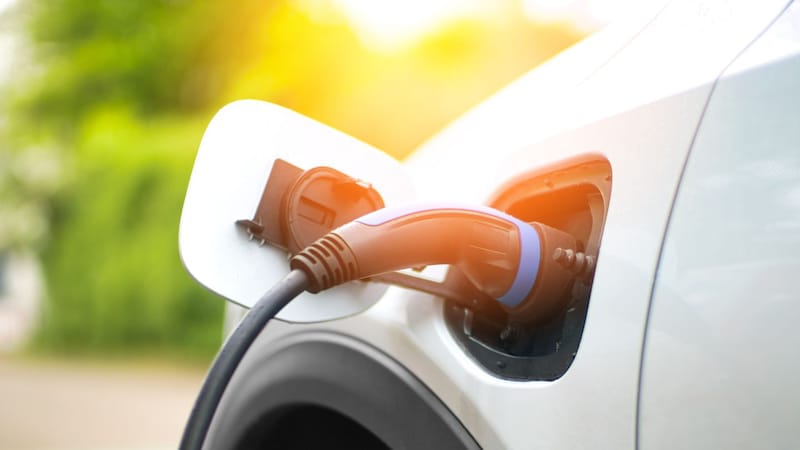Cost to own an electric vehicle

Quick insights
- Electric vehicles (EVs) have a higher upfront cost but can lead to significant savings in the long run.
- Charging and maintaining an EV can be less expensive than traditional fuel and maintenance costs for gasoline cars.
- Insurance, registration and other costs associated with owning an EV can vary based on location and specific vehicle model.
According to Kelley Blue Book, 1.3 million EVs were sold in the U.S. in 2024. As the world shifts gears towards a greener future, EVs are sparking interest. But what's the real cost of owning one? Let's plug in and find out.
How much do electric cars cost?
Electric cars tend to have a higher purchase price than their gasoline counterparts. According to Kelley Blue Book, the average cost of a new electric car in the U.S. is around $55,500, with the full price range spanning from around $29,000 to more than $100,000 for the pricier luxury models.
To offset the initial cost, federal and state governments may offer incentives for electric car purchases. The federal tax credit can be up to $7,500 for new EVs and $4,000 for select pre-owned vehicles. State incentives vary by location, and even the federal credits are subject to expiration, cancellation or other changes.
Electric vehicle charging costs
There are three primary methods of charging your EV: home charging, paid public charging and complimentary public charging. Let’s take a closer look:
- Home charging: Most EV owners charge their cars at home. The cost of electricity can vary widely by region, but on average, you can expect to pay $0.12-$0.18 per kilowatt hour (kWh). This means charging an EV at home could cost around $500-600 annually, which is less than the average cost for a year of gasoline.
- Charger installation: Installing a home charging station can typically cost $500- $2,000, depending on the type of charger and the specifics of the installation. This initial upfront cost should factor into your calculations when conducting a cost-benefit analysis between an EV and gasoline-powered vehicle.
- Paid public charging: As of January 2025, there are more than 75,000 EV charging stations in the U.S, of which roughly 75% are type-2 chargers and 25% direct current fast chargers. While typically faster than their complimentary and home charging counterparts, paid public charging stations can also be much more expensive, ranging from $0.15-25 per kWh for slower chargers to $0.45-65 per kWh for fast ones.
- Complimentary public charging: Some locations, like grocery stores, shopping centers, hotels, hospitals or public parks, may offer a limited number of complimentary charging stations. Please note that while these stations can be very helpful, they are typically limited in number and operate on a first-come, first-served basis and can charge at a much slower rate than other EV chargers.
EV charging speed
Let’s take a closer look at the three types of EV chargers and their average charging speed:
- Type 1 chargers: Type 1 EV chargers are nicknamed “trickle-chargers” for a reason. They are the slowest, most basic chargers and often use a standard household 120 volt (V) outlet. At an average rate of 3-6 miles of distance per hour charged, it would take an EV 30-50 hours or more to reach a “full” charge of 80-90%.
- Type 2 chargers: Type 2 EV chargers use a 240V outlet, which is more powerful than a standard household outlet. As such, they can typically charge at a rate of 20-30 miles of distance per hour of charge, or 5-10 hours to reach the 80-90% charge range. Most home and complimentary public chargers are type 2 chargers, which make them a better option for overnight charging than the sort of quick charge needed on long trips.
- Type 3 chargers: Type 3 EV chargers, also know as DC fast chargers, offer the fastest charging speeds through use of a 480V DC power source. As a result, Type 3 chargers can typically reach an 80-90% charge in 20-40 minutes. These chargers also come with a cost, however, with an average cost of $0.45-65 per kWh.
EV charging speed is a major contributing factor to charging cost. Type 1 "trickle-chargers" can take 30-50 hours to reach an 80-90% charge, but they take less energy than powering a computer for the same length of time. Type 2 chargers can reach the 80-90% charge range in 5-10 hours, but they come with higher upfront and charging costs. Type 3 chargers, or DC fast chargers, can achieve an 80-90% charge in 20-40 minutes, but they are also the most expensive.
EV maintenance costs
EVs have fewer moving parts than traditional cars. EV owners can save on maintenance expenses like oil and filter changes, which can lead to lower maintenance costs. The one exception to this is the battery.
While rare, battery replacement is a significant cost to consider. A new battery can cost between $4,000 and more than $30,000, but most come with long-term warranties.
Other costs of owning an EV
Other categories of expenses for owning an EV are pretty standard among all types of vehicles: namely auto insurance, state registration, parking fees and tolls. Insurance costs for EVs can be higher due to their higher initial cost and more expensive parts.
EV registration costs vary by state. Some states offer reduced fees for EVs, some states have no price difference and other states charge additional fees to offset lost gas tax revenue.
Parking fees are typically going to be the same for any type of vehicle. Many states also offer no distinction for type of vehicle in terms of tolls, but states like California, Florida and New Jersey offer toll-related incentives for EVs, including access to High-Occupancy Vehicle (HOV) lanes or EV toll discounts during off-peak hours.
How much you can save by switching to an EV?
All of that said, how much money can you actually save with an EV? Let’s take a more comprehensive look:
- Fuel savings: The Natural Resources Defense Council estimates that, on average, it costs less than 45% as much to travel the same distance in an EV as a conventional vehicle. While the average EV driver spends less than $500 per year on charging, it typically costs more than $1,100 per year for gas.
- Maintenance savings: With fewer moving parts and no oil changes needed, you could save on maintenance costs over time.
- Tax credits and incentives: Federal and state incentives can help offset the higher upfront cost of an EV, leading to potential savings.
- Potential annual savings: The average costs associated with owning and driving a vehicle change every day and differ for every driver, so it’s difficult to put a concrete number to the potential cost difference. That said, when all of the various factors are added up, switching to an EV could potentially save you $500 to $1,000 per year over the cost of driving and maintaining a gasoline vehicle.
The bottom line
While the upfront cost of electric cars can be higher, the potential savings in fuel, maintenance and available tax credits can make them a cost-effective choice in the long run. However, factors such as insurance and registration costs, charging infrastructure and the replacement costs of an EV battery should be considered when calculating the total cost of owning an EV.



